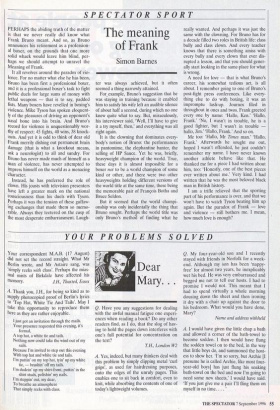SPECTATOR SPORT
The meaning of Frank
Simon Barnes
PERHAPS the abiding truth of the matter is that we never really did know what Frank Bruno meant. And so, as Bruno announces his retirement as a profession- al boxer, on the grounds that one more solid whack would leave him blind, per- haps we should attempt to unravel the Meaning of Frank.
It all revolves around the paradox of vio- lence. For no matter what else he has been, Bruno has been first a professional boxer, and it is a professional boxer's task to fight public duels for large sums of money with lethal weapons — that is to say, padded fists. Many boxers have revelled in boxing's violence. Mike Tyson has spoken eloquent- ly of the pleasures of driving an opponent's nasal bone into his brain. And Bruno's record for violence is unquestionably wor- thy of respect: 45 fights, 40 wins, 38 knock- outs. And yet it is odd to think of dear old Frank merrily dishing out permanent brain damage (that is what a knockout means, ask a neurologist) to all and sundry. For Bruno has never made much of himself as a man of violence, has never attempted to impress himself on the world as a menacing character.
Instead, he has preferred the role of clown. His jousts with television presenters have left a greater mark on the national consciousness than his duels with Tyson. Perhaps it was the tension of these guffaw- ing exchanges that made them so memo- rable. Always they teetered on the cusp of the most desperate embarrassment. Laugh- ter was always achieved, but it often seemed a thing narrowly attained.
For. example, Bruno's suggestion that he was staying in training because it enabled him to satisfy his wife left an audible silence of about half a second, during which no one knew quite what to say. But, miraculously, his interviewer said, 'Well, I'll have to give it a try myself, then,' and everything was all right again.
It is the clowning that dominates every- body's notion of Bruno: the performances in pantomime, the elephantine banter, the selling of HP Sauce. Yet he was, briefly, heavyweight champion of the world. True, these days it is almost impossible for a boxer not to be a world champion of some kind or other, and there were two other heavyweights holding different versions of the world title at the same time, these being the memorable pair of Francois Botha and Bruce Seldon.
But it seemed that the world champi- onship was only incidentally the thing that Bruno sought. Perhaps the world title was only Bruno's methoa of finding what he
really wanted. And perhaps it was just the same with the clowning. For Bruno has for a decade filled two roles in British life: class bully and class clown. And every teacher knows that there is something amiss with every bully and every clown that ever dis- rupted a lesson, and that you should gener- ally start looking in the same.place for what. is wrong.
A need for love — that is what Bruno's career, his somewhat tedious act, is all about. I remember going to one of Bruno's post-fight press conferences. Like every- thing else to do with boxing, it was an impromptu lash-up. Journos filed in throughout in ones and twos. Frank greeted every one by name: 'Hallo, Ken."Hallo, Frank."No, I wasn't in trouble, he is a good fighter, but I wasn't in trouble hallo, Jim.' 'Hallo, Frank.' And so on.
Me too: 'Hallo, Mr Times man."Hallo, Frank.' Afterwards he sought me out, hoped I wasn't offended, he just couldn't remember my name. I have never known another athlete behave like that. He thanked me for a piece I had written about him, too: 'Honestly, one of the best pieces ever written about me.' Very kind, I had written that he was the most beloved black man in British history.
I am a trifle relieved that the sporting part of his performance is over, and that we won't have to watch Tyson beating him up again. But the paradox of Frank — love and violence — still bothers me. I mean, how much love is enough?


























































 Previous page
Previous page